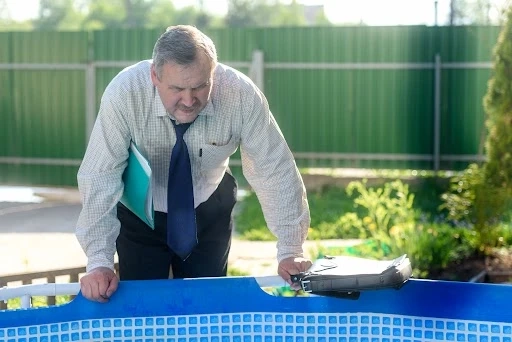After months of searching and home tours, you've found the perfect home. You love the layout. You're drawn to the neighborhood, but there is one minor detail that bothers you: a swimming pool in the backyard. You picture yourself or your children splashing around in it on a hot summer day, but not all homeowners with pools take great care of them.
It is tempting to take a dip and cool off whenever you want. Swimming around in the water for hours sounds like a dream. In reality, the weather can get cooler, and swimming pools are both a benefit and a responsibility. Maintaining your swimming pool and ensuring it meets local requirements for pool fencing is essential.
If you are looking at buying a home that has a swimming pool, you need to get a pre-purchase pool inspection alongside your pre-purchase building and pest inspection. Whether you are a buyer, seller or owner of a property with a swimming pool, the condition of the pool and its surroundings must be checked by a qualified professional. It's obvious that swimming pools make homes more valuable. However, before installing a pool, you must get the facts about caring for one.
What is a pool inspection?
The Australian Government has a number of laws enforced to ensure that pools are safe and not a hazard. Private pool owners in all states must ensure their swimming pool is compliant with the relevant legislation.
So, you are about to purchase a property? Great! Now it is your chance to complete the pool inspection. A pool inspector's report is a document issued by a licensed inspector containing a description of the current state of the home in question. This can range from a summary of what to expect regarding the whole place to specific details on the structure and functionality of particular portions of it.
Why do you need pre and post-pool inspection?
You should get a pool inspection, which can be done at the same time before and after purchasing a property. It's important to note that pool safety inspection focuses on issues like pool fencing and safety gates. A pool inspector will be able to identify safety hazards, but a pool safety inspector is a specialised inspector, and he is the one you should contact for a detailed inspection of the safety of the pool.
The inspector will then provide you with a report outlining the pool's condition and any issues identified during the inspection. Depending on the inspector, they may provide a written report, an electronic report, or a combination of both. This report can be extremely useful as you consider whether to move forward with the purchase of the property.
Pool safety compliance
When you want to set up a swimming pool at home, chances are you will want to know what things you need to do to ensure that your pool is ready. Several steps will help you get a pool safety certificate. Pool safety compliance is based on several factors, such as accessibility and how accessible the pool is to children.
A gate or barrier between the pool area and the rest of the property is an important safety measure to prevent accidental falls or unsupervised access to the pool. This can include installing a self-closing and self-latching gate or using other types of barriers such as walls, fences, or hedges.
It is also essential to limit the ways that people can access the pool area to prevent unsupervised access. This includes not allowing doors to open directly into the pool area and ensuring that windows that open into the pool area are securely screened or limited in the amount that they can be opened.
Doors and windows inspection
This is a general guideline for pre-purchase and post-purchase Pool Inspection. It's important to have a barrier or gate between the pool area and the rest of the property to prevent accidental falls or unsupervised access to the pool. This barrier should be self-closing and self-latching and should be placed in a way that requires people to enter through the gate or barrier in order to access the pool area.
It's important to note that these guidelines may vary by location and jurisdiction. It's always recommended to check with local authorities about pool safety requirements to be compliant. Some authorities also recommend installing pool alarms, pool covers and fencing in addition to the guidelines mentioned above.


